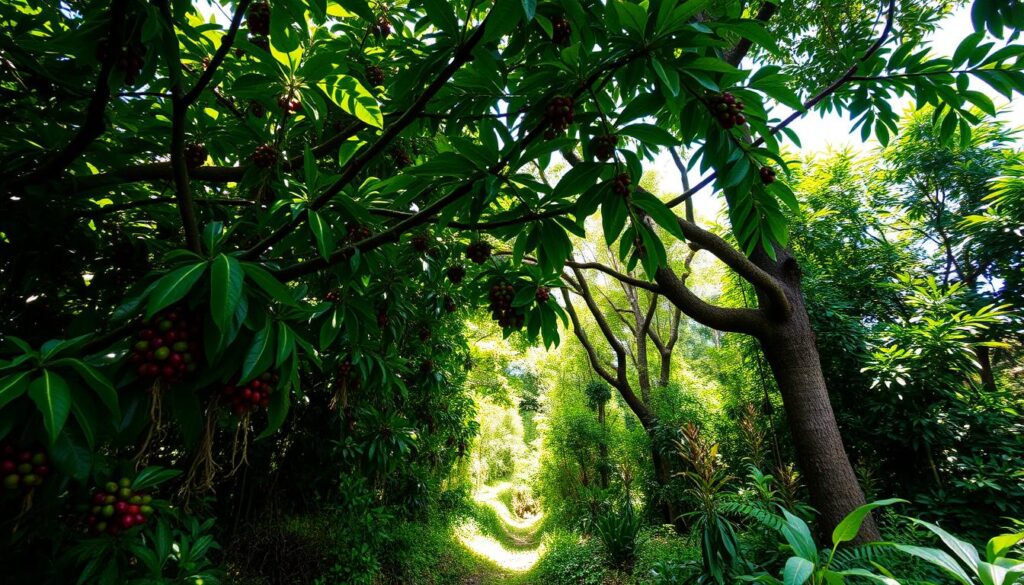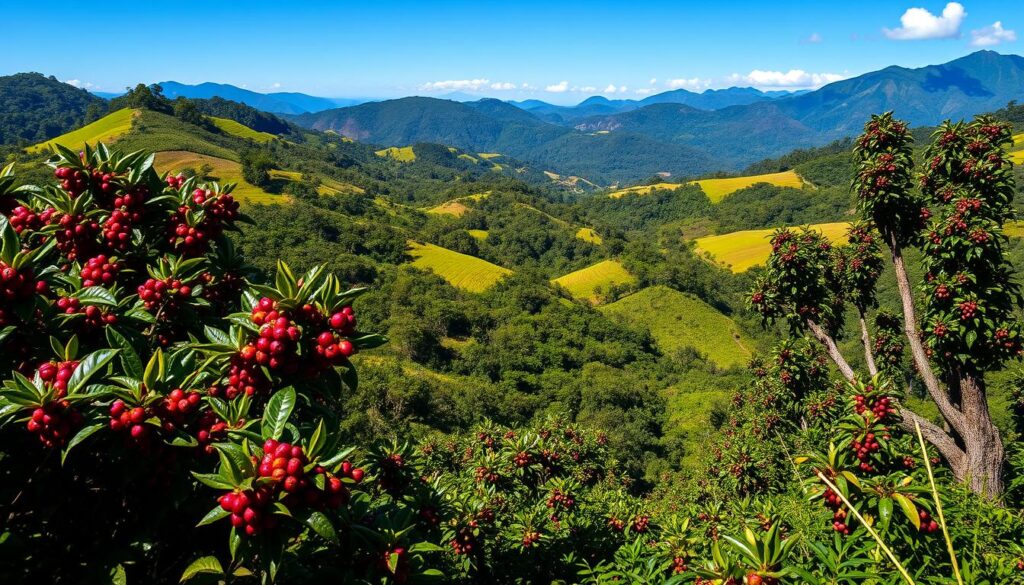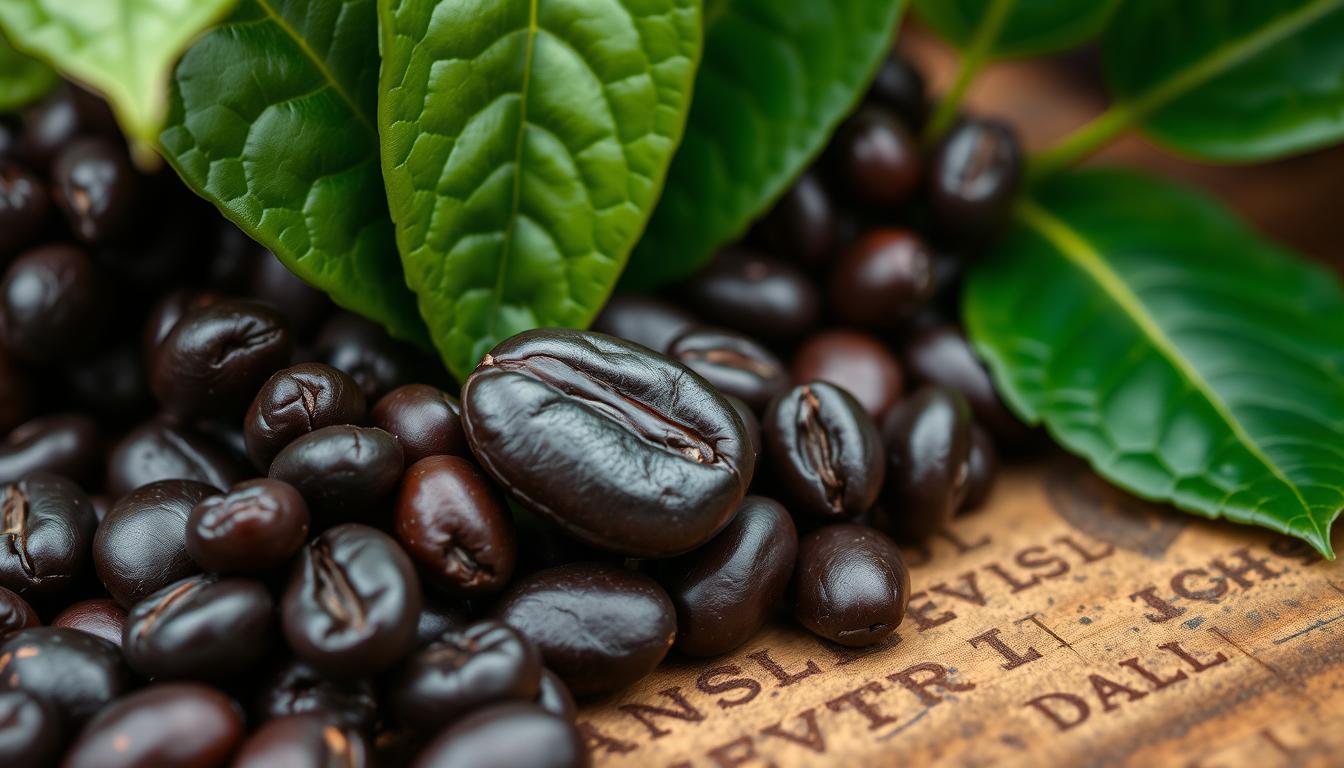If you love coffee, you might have heard about Honduran coffee. But what makes it special? Honduran coffee is known for its unique flavors and the special place it’s grown. It’s a favorite among coffee fans everywhere. Let’s explore why Honduran coffee is a top pick for your morning cup.
Key Takeaways
- Honduras is the largest coffee producer in Central America and the 6th largest in Latin America.
- Honduran coffee is renowned for its wide range of flavors, from fruity and floral to rich chocolate and caramel notes.
- The country’s unique terroir, including its ideal climate and high-altitude growing regions, contributes to the exceptional quality of Honduran coffee.
- Honduran coffee is versatile, working well for various brewing methods and roast levels.
- Small, independent farms produce the majority of Honduran coffee, showing the dedication and passion of its growers.
The Rich History and Evolution of Honduras’s Coffee Industry
Honduras has a long history in coffee production. Central American coffee has been valued for centuries. Honduras has led this industry for many years.
From the 1700s to today, Honduras has grown a lot. It’s now a top coffee exporter worldwide.
From Colonial Times to Modern Production
Coffee was first sent from Honduras in the 1700s. Commercial farms started in the 1800s. By the early 1900s, Honduras was known for its quality coffee.
By 1990, coffee production had grown 807%. More land was used for coffee, up 129% from 1950.
Overcoming Hurricane Mitch’s Impact
In 1998, Hurricane Mitch hit Honduras hard. It damaged the coffee industry a lot. Production fell from 15 million pounds to 4 million pounds.
But, the industry recovered. Thanks to the Instituto Hondureño de Café (IHCAFE), it came back stronger.
The Role of IHCAFE in Industry Development
Founded in 1994, IHCAFE helped the Honduran coffee industry. They improved quality and helped small farmers. They also promoted sustainable farming.
This helped farmers grow high-quality, single-origin coffees. These are in high demand worldwide.
“Honduras is the largest central-American coffee producer and sixth-largest coffee producer globally, with an annual production of over six million 60kg bags.”
Today, Honduras is the 6th largest coffee producer globally. It’s also the 4th largest Arabica producer. Its rich history and farmer dedication make it a top coffee producer.
Honduran Coffee’s Unique Growing Conditions
Honduras’s geography and climate are perfect for growing top-notch shade-grown coffee. The high altitudes, from 1,200 to 1,700 meters, slow down coffee cherry maturation. This leads to a balanced body and better flavor.
The rich volcanic soil in these areas also adds to Honduran coffee’s unique taste. This soil, combined with the high altitudes, makes Honduran coffee stand out.
The tropical climate of Honduras is ideal for Arabica coffee beans. Temperatures range from 21 to 27 degrees Celsius, and the rainy season is from May to November. This climate, along with the nutrient-rich soil, gives Honduran coffee its mild acidity and nuanced flavors.
Honduras has a long history in coffee production, starting in the late 19th century. By the 1900s, it was exporting over 54,000 pesos worth of coffee. Today, Honduras is the largest coffee producer in Central America and the sixth-largest globally, producing over six million 60kg bags annually.
Despite challenges like Hurricane Mitch in 1998, which destroyed 80% of coffee production, the industry has bounced back. The Instituto Hondureño de Café (IHCAFE) was established in 1994. It supports quality coffee production and helps small-scale farmers grow their businesses with low-interest loans.

Honduran coffee is known for its exceptional flavor profiles. From El Paraiso’s sweet notes to Agalta’s rich chocolate undertones, each region in Honduras offers something special. Honduran coffee’s diversity and excellence make it a favorite among coffee lovers.
Distinguished Regions and Their Flavor Profiles
Honduras is home to many single-origin coffee-growing regions. Each one has its own unique flavor profiles that coffee lovers around the world adore. From the sweet notes of El Paraiso to the rich chocolate of Agalta, and the high-elevation varieties in Comayagua, Honduran coffee has something for everyone.
El Paraiso – Sweet and Nuanced Notes
The El Paraiso region in the western highlands is famous for its Catuai and Caturra coffee. These beans have a delicate, sweet taste with floral and fruity hints that stay with you.
Agalta – Rich Chocolate Undertones
In southwestern Honduras, Agalta is known for its full-bodied coffee. It has rich chocolate flavors and floral aromas. The Bourbon, Typica, and Caturra varietals grown here make for a memorable coffee experience.
Comayagua – Premium High-elevation Varieties
Comayagua is where you’ll find large coffee haciendas. They grow high-elevation Bourbon, Catuai, and Caturra varietals. These beans offer a complex taste with dark chocolate, nuts, and a lively acidity.
Other notable regions in Honduras include Copán, Santa Barbara, and Ocotepeque. Each adds to the variety of flavors that make Honduran coffee so popular among single-origin coffee fans.

What Makes Honduran Coffee Stand Out
Honduran beans have earned a special spot in the world of specialty coffee. This Central American country has a unique mix of factors. These factors make its coffee exceptional and full of complex flavors.
The diversity of Honduran coffee’s microclimates and high-altitude growing conditions is key. The country’s varied terrain, from lush forests to rugged mountains, is perfect for growing many coffee varieties. This variety leads to a wide range of flavors, from sweet to rich chocolate notes.
The Cup of Excellence program in Honduras, started in 2004, has greatly helped its coffee reputation. This competition finds the top 30 coffee beans through blind tastings. It highlights Honduran coffee’s exceptional quality and unique flavors.
Honduran coffee is known for its balanced body and mild acidity. It has flavors like chocolate, caramel, and citrus. These flavors come from the country’s focus on quality and sustainable farming.
Small-scale producers in Honduras make up over 50% of the coffee industry. Their story is one of resilience and passion for coffee. As demand for specialty coffee grows, Honduran beans will continue to impress coffee lovers worldwide.
“Honduran coffee is known for its balanced body, mild acidity, and diverse flavor notes, making it a standout in the world of specialty coffee.”
Conclusion
Honduran coffee has become a key player in the global specialty coffee market. The country has moved from producing low to middle-quality beans to now making exceptional coffee. This shows its hard work and dedication to quality.
The different growing regions in Honduras offer unique flavors. These range from tropical fruit notes to rich, chocolatey undertones. This variety has won the hearts of coffee lovers around the world.
Honduras is now focusing on sustainable practices. It’s using eco-friendly methods and supporting young coffee farmers. With government and international support, Honduras is set to keep producing top-quality Arabica beans.
The story of Honduran coffee is one of resilience and innovation. It shows the country’s love for coffee cultivation. When you try Honduran coffee, you’ll experience its unique flavors and the passion of its farmers.

